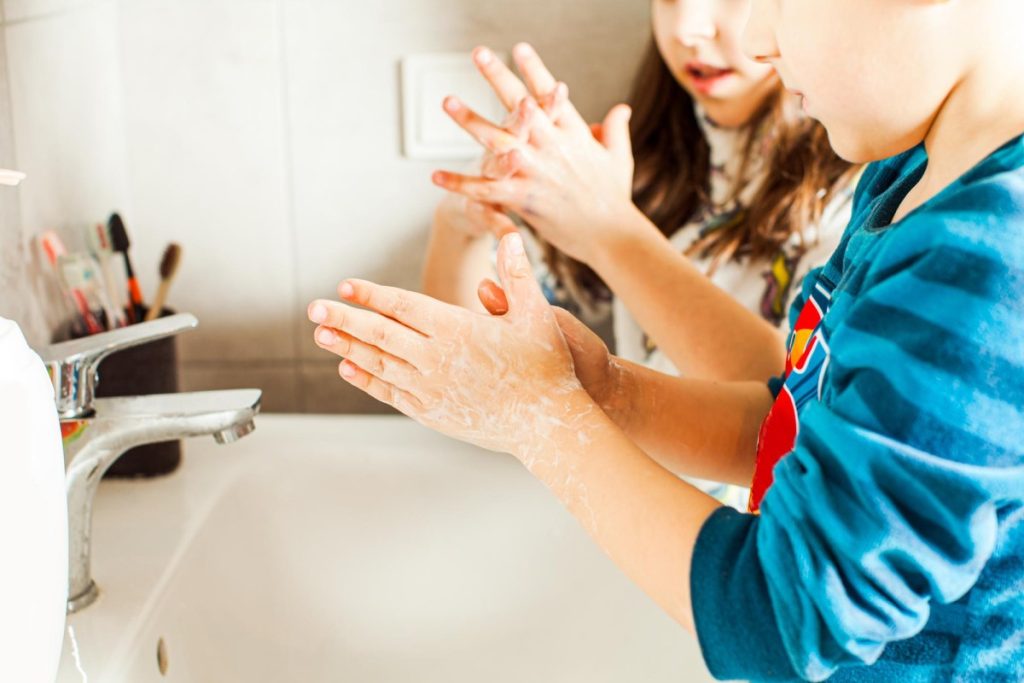As the cough and cold season settles in across Massachusetts, parents and caregivers are looking for ways to keep their preschoolers healthy and thriving. This year, flu and RSV are particularly prevalent, and cold and COVID viruses are circulating widely. With little ones being especially vulnerable, it’s important to instill good hygiene habits while keeping activities fun and engaging. Below are creative, educational activities that teach kids about health and hygiene while helping them stay healthy this winter.
Glitter Cough Simulation
Teach the importance of covering sneezes and coughs with a hands-on demonstration. Sprinkle glitter on a child’s hand and have them pretend to sneeze into their hand. Then, let them shake hands with others or touch surfaces to show how germs spread. Follow up by washing hands together, showing how soap and water remove the “germs.”
This activity not only makes hygiene lessons visual but also reinforces the necessity of proper handwashing.
Handwashing Songwriting
Make handwashing fun by creating a simple song with your preschooler to help them wash their hands for the recommended 20 seconds. Use familiar tunes like “Twinkle, Twinkle, Little Star” or “Happy Birthday,” and add lyrics about scrubbing and staying clean.
This activity combines music, language skills, and hygiene to make learning memorable and effective.
Blacklight Germ Hunt
Use UV-reactive “germ powder” or lotion to show where germs hide. Apply it to hands before washing, then use a blacklight to reveal missed spots after a “quick wash.” Repeat the activity with a thorough handwashing to demonstrate how to eliminate germs effectively.
This visual and interactive activity teaches thorough handwashing while making it a fun experiment.
DIY Soap-Making
Turn soap-making into a sensory and educational activity. Let kids help make soap bars or shapes using safe ingredients and colorful molds. Allow them to pick fun scents, like lavender or bubblegum, to personalize their creation.
This project teaches basic chemistry concepts and encourages frequent handwashing with their custom-made soap.
“Germ Stopper” Spray Bottle Game
Teach kids about cleaning surfaces to reduce germ spread with this fun cleaning game. Give them a spray bottle filled with water or a safe cleaning solution and let them “hunt” germs around the house.
Not only does this foster responsibility, but it also introduces the concept of disinfecting as part of good hygiene.
Playdough Germ Models
Bring microbiology to life by making germ models with playdough. Create simple shapes to represent bacteria, viruses, and cells while discussing their roles in health and illness.
This hands-on activity makes abstract concepts tangible and encourages curiosity about science.
Temperature-Sensitive Soap
Transform handwashing into a magical experience by using color-changing temperature-sensitive soap. When kids wash their hands with warm water, the soap changes color, adding a fun, interactive element.
This activity is not only enjoyable but also teaches kids about temperature and the importance of warm water for effective cleaning.
Sensory Handwashing Station Expansion
Elevate a basic handwashing station by adding sensory elements. Use scrub brushes, sponges, or soft washcloths for tactile exploration. Rotate fun, kid-friendly soap scents and incorporate washable toy animals or figures that “need a bath.”
This activity keeps handwashing engaging while enhancing sensory development.
“Good Germ vs. Bad Germ” Puppet Show
Use puppets or toys to create a story about “good germs” (like helpful gut bacteria) and “bad germs” (like cold viruses). Act out scenarios where good hygiene practices keep bad germs away.
This imaginative activity introduces kids to the balance of microbes in an accessible way.
Hand Hygiene Bingo
Create a bingo card filled with healthy habits such as washing hands, covering coughs, or using tissues. Kids earn stickers for completing each task, with rewards for filling a row or the whole card.
This game builds routine-based learning and rewards healthy habits in a fun and motivating way.
By incorporating these activities into your daily routine, you can help your preschooler stay healthy and develop good hygiene habits that last a lifetime. Keeping the learning process fun and interactive ensures that kids not only understand the importance of hygiene but also enjoy practicing it.
At Little Planet Preschool, we’re committed to fostering a safe and healthy environment for your child to learn, grow, and thrive. Our programs incorporate fun, hands-on activities like these to build good habits and promote wellness. Schedule a tour today to see how we can help your child shine brighter this winter season—happy, healthy, and ready to explore the world!

